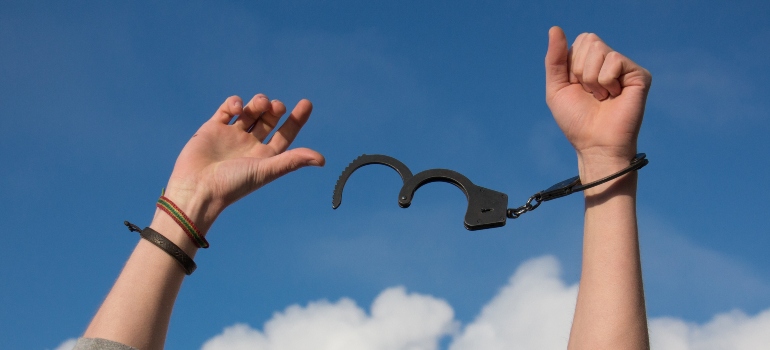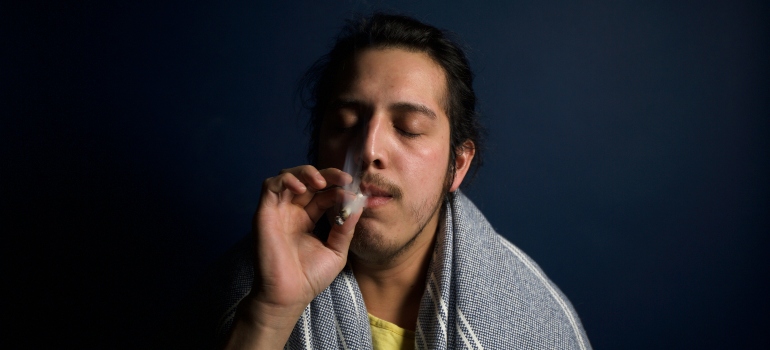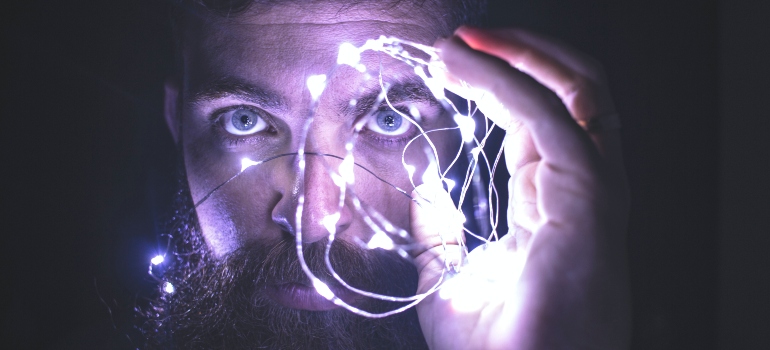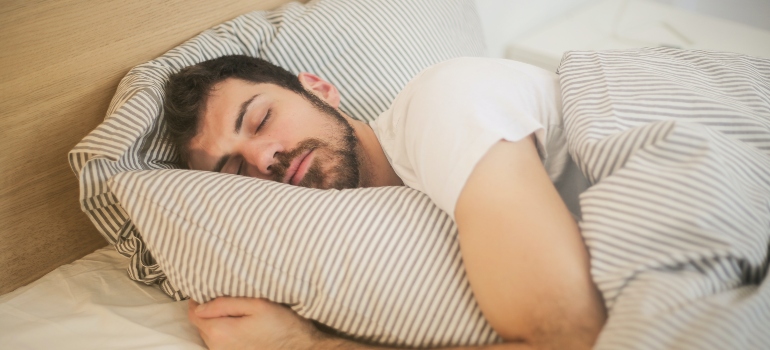Marijuana Addiction
Break free from marijuana addiction with a supportive and experienced team of addiction experts by your side. Harmony Ridge Recovery Center WV offers one of the best marijuana rehab programs in West Virginia.
Contrary to popular belief, marijuana is an addictive substance. Marijuana addiction is just as harmful as an addiction to any other illegal substance. Your mind and body can become dependent, which is a risk to your personal life and mental well-being. If you have been using this particular substance for a long time, you may need to enroll in one of the marijuana treatment programs. Luckily, there are plentiful resources and options within addiction treatment WV centers to assist you on your path to recovery. Contact Harmony Ridge Recovery Center today, and we will provide you with a customized marijuana rehab West Virginia program that will see you to full recovery in no time!

What is Marijuana?
Marijuana, or cannabis, is the green, brown, or gray mixture from the dried flowers of the cannabis Sativa plant. This mixture goes by many common street names like weed, herb, pot, and grass. This particular substance is quite prevalent among the younger population, who might not be aware of its long-term adverse effects. Marijuana has chemicals that act on your brain and can alter your mood or consciousness. People use marijuana in multiple ways:
- Smoked: Some people smoke marijuana in the form of a joint or hand-rolled cigarette, as well as through pipes, water pipes (or bongs), and blunts (marijuana rolled in a cigar wrap). There is also a method called “dabbing” when users smoke the oils from the plant.
- Consumed: Marijuana is used to brew tea, specifically when it is sold or consumed for medicinal purposes, mixed or cooked into foods called “edibles,” such as brownies, cookies, or candy.
- Vaporized: Vaporizing marijuana through electronic vaporizers is another form of consumption.
Marijuana is legal in some states, but it’s still illegal in others. Some state laws allow marijuana use for only medical purposes, while other states have legalized recreational use. The more potent form of marijuana includes sinsemilla, from tended female plants and concentrated resins with high doses of the active ingredients. These higher doses include honeylike hash oil, waxy budder, and hard amberlike shatter. The resins are popular with individuals who use this substance for recreational and medicinal purposes.
Marijuana’s legal status does not mean that the substance is not dangerous and that a marijuana rehab center is unnecessary. Alcohol is legal, after all, and many people need to go to individual therapy for addiction due to alcohol abuse. Like any other substance that alters your mind in any way, marijuana is dangerous and addictive.
Why do people use marijuana?
What attracts users to marijuana is the mind-altering effect due to its main psychoactive chemical: delta-9-tetrahydrocannabinol (THC). This chemical is responsible for most of the intoxicating effects that people seek and what feeds the addiction. THC is found in resin that mainly comes from the leaves and buds of the female cannabis plant. This plant contains more than 500 other chemicals that include more than 100 compounds called cannabinoids related to THC. These chemicals provide a certain “high” in people, which alters the way they think and act. After some time, the state of mind that comes with marijuana use becomes preferable, and people start using the substance more and more, ultimately needing to visit one of the marijuana rehab West Virginia centers.

The best way to stop using is simply to change the way that one thinks. Therefore, the best form of marijuana therapy involves cognitive behavioral therapy for substance use disorders. During this therapy, the person struggling with marijuana use will be able to overcome their negative thoughts. And reshape them into productive ones.
Is Marijuana Addictive?
Marijuana, unlike many other substances, does not create a “true” physical dependence. What this means is that your body may not experience significant adverse effects if you stop using the drug. However, you can get addicted to marijuana, and many people are. Furthermore, marijuana addiction can also lead to the abuse of other substances.
However, this is true for “basic” marijuana. Since the 1960s, the THC content has increased as much as 300 percent, affecting marijuana abuse and tolerance. This higher dose of THC in the marijuana used today can contribute to increased toxication-related risks and a greater risk of dependence. Marijuana can also be “laced” with other chemicals, creating a nasty cocktail that can easily induce even physical dependence. In fact, other chemicals have been found during numerous marijuana family therapy for addiction programs. The result was usually the need for medical detox.
There is also some research that suggests an estimated 9% of marijuana users develop an addiction. The increased rate of addiction is higher among people who start using the substance at a young age, and an estimated 17 percent become addicted. Out of people who use marijuana daily, an estimated 25 to 50% develop an addiction. This addiction is mostly psychological, however. While some people do develop a physical addiction to marijuana (due to the added chemicals), most will simply require psychological therapy such as art therapy rehabilitation. Those that develop a physical dependence may require a more intensive form of treatment.
Risks of marijuana use
Marijuana addiction can be clinically diagnosed and can hurt a person’s life. The effects that marijuana addiction can have on your personal life pose risks such as:
- Legal complications
- Poor academic performance
- Problems in the workplace
- Impaired ability to learn and remember things
Psychological dependence can develop in the same way that other addictions develop. An addiction to marijuana starts when the individual begins using, and cannabinoid receptors in the brain are activated by a neurotransmitter called anandamide. THC imitates and blocks the actions of natural transmitters like anandamide to the point where the person’s body no longer produces a sufficient amount on its own. The brain then starts to be reprogrammed and becomes dependent on marijuana to feel normal. If the user stops taking more THC, they will often go through withdrawal symptoms due to the lack of the natural transmitter. The urge to quit marijuana use and the inability to do so is a strong indicator of an addiction.

Marijuana abuse can also lead to traumatic experiences, especially in the initial stages. Many people are unaware of how they will act under the influence of the drug, and they end up in traumatic situations, ultimately needing to attend EMDR therapy for drug addiction. Luckily, all marijuana effects are reversible, given proper care and enough time at one of the marijuana rehab West Virginia centers.
As with any addiction, there are symptoms of withdrawal when users attempt to abstain from the drug. Marijuana addiction is often diagnosed during adolescence or young adulthood. However, because of current trends toward a wider societal acceptance of marijuana use and its availability in medicinal and recreational forms, older adults’ addiction rates may increase as well.
Diagnosing a marijuana addiction
Diagnosing a marijuana addiction can be troublesome at times due to how the drug works. However, a diagnosis is necessary to be admitted to a marijuana rehab center. Luckily, there are some behavioral and physical signs that can warn an individual about marijuana addiction.
Behavioral signs can include:
- Distorted perceptions
- Impaired coordination
- Issues with thinking and problem solving
- Continuous problems with learning and memory
Other signs of marijuana addiction and abuse can be:
- Red, blurry, bloodshot eyes
- Mucus-filled cough
- Fast heartbeat
- Hunger
- Dry mouth
- Anxiety
- Slow reaction time
- Loss of control
Marijuana withdrawal symptoms
The withdrawal symptoms brought on by long-term marijuana use usually develop within one week after discontinued use. Some of the most common marijuana withdrawal symptoms are:
- Irritability, anger, or aggression
- Nervousness or anxiety
- Difficulty sleeping
- Restlessness
- Depression
- Abdominal pain
- Shakiness or tremors
- Sweating, fever, and chills
- Headache
The withdrawal symptoms from marijuana detox can make it difficult to quit. According to Marijuana Anonymous (MA), the most common withdrawal symptom is insomnia. It can vary from person to person, but the period of sleepless nights can last anywhere from two days to a few months, depending on the length of time and severity of the marijuana use. That is why every marijuana rehab West Virginia center carefully monitors their patient’s sleeping schedules and offers sleeping aids where necessary.

Depression
MA reports that depression is the next most commonly experienced withdrawal symptom, followed by nightmares and vivid dreams. Some people also experience different levels of anger when detoxing from marijuana. Some individuals express a low level of anger and rage, irritability, or sudden outbursts of anger. This anger is directed at themselves, loved ones, or the world in general.
Lack of motivation
There are also people who experience a distinct lack of motivation after they stop using marijuana. These people usually resort to motivational interviewing for substance abuse to “get back on track”. But this is perhaps one of the milder withdrawal symptoms, as there are no physical ailments. Nonetheless, lack of motivation is what drives many people to continue using even if they know they should stop.
In fact, experiencing any of these withdrawal symptoms makes it difficult to stop using. Many marijuana withdrawal symptoms are the same as that of other conditions and issues, so a professional assessment is needed to determine if withdrawal is due to marijuana use. The fact of the matter is that marijuana abuse is often accompanied by other substance abuse and/or mental health issues, all of which need to be diagnosed separately at a marijuana rehab center.
Marijuana treatment programs
When treating marijuana addiction, the resources and options are similar to treating addictions to alcohol and other substances. Studies have shown that scientifically valid approaches like Twelve Step facilitation, cognitive behavioral therapy, and motivational enhancement therapy can be effective methods in treating addiction, depending on the person’s situation. However, as every individual is unique, the treatment needs to be customized in every single case. While not every marijuana rehab center thinks this way, Harmony Ridge Recovery Center believes that each patient requires a unique treatment model. Our holistic therapy for addiction is just one of the many treatment modalities that are available to our clients. We pride ourselves on being able to create a tailor-made treatment program for every one of our patients! Harmony is not your average marijuana rehab West Virginia center; we are fully committed to always doing what is best for our patients.

That said, marijuana addiction treatment usually involves two steps: Medical detox and either residential or outpatient treatment. Group therapy is also highly recommended.
Medical detox
There are no medical treatments available to support someone detoxing from marijuana, but the available medical detox West Virginia programs can help treat individual symptoms and provide overall support. Behavioral interventions and therapy have shown success in helping patients to get and remain sober. However, medical detox is necessary if the person is suffering adverse effects from various chemicals that may be introduced to marijuana over time.
Residential vs. Outpatient Treatment
Depending on the situation, rehabilitation programs are offered either as inpatient or outpatient. The best course of action always depends on the severity of the addiction. Outpatient rehabilitation programs allow the patient to live at home and report to the designated facility for treatment. These programs can vary in terms of time commitment, ranging from a few hours a week to several hours a day. A person undergoing outpatient treatment for addiction will take part in group and individual activities. Some programs may offer medical care and prescribed medications. People with less severe addiction and a lower risk of experiencing withdrawal symptoms, people who also have a sound support system and reliable transportation, will benefit most from this form of treatment.
The main difference between outpatient and residential rehab programs is that inpatient programs provide 24-hour care, housing, supervision, and medical care. These types of treatment programs tend to be more expensive. If a person has a severe addiction and a higher risk of experiencing severe addiction and withdrawal symptoms, this may be a better option. Access to medical care and 24-hour supervision will provide a safe place for them as they go through the withdrawal process.
Group therapy
Many people who struggle with marijuana addiction start to lose interest in social events. They slowly lose their social skills until they reach the point where simply talking to others is daunting. The answer to this particular problem lies in group therapy for addiction, where patients have the ideal setting to refresh their social skills. Under the guidance of a professional therapist, participants will learn how to develop healthy coping skills, manage their cravings, and much more.
Group therapy can also be augmented with other treatment modalities, such as dialectical behavior therapy for addiction, which involves learning more about mindfulness, distress tolerance, interpersonal effectiveness, and emotion regulation.
Getting rid of your marijuana addiction starts at Harmony Ridge Recovery Center!
If you are struggling with addiction, know that there are treatment options available to you. Recovering from any condition like marijuana addiction starts when you pick up the phone and ask for help. Being one of the best marijuana rehab West Virginia centers, Harmony Ridge Recovery Center has a unique approach to addiction treatment. We use evidence-based addiction treatment and a comprehensive-holistic system that includes individual and group therapy, cognitive-behavioral therapy, and 24-hour medical supervision and care. Our recovery center has an experienced team of licensed medical professionals, administrative staff, and management ready to help you recover from your addiction. Contact us today!
Frequently Asked Questions
What is your approach to marijuana rehab?
Our approach remains the same regardless of the substance type. Our team will perform an in-depth bio-psycho-social assessment to determine your medical issues, mental health issues, substance use history, family history, etc. We always create a fully unique, customized treatment program for every single one of our clients.
How long does marijuana rehab take?
The length of your treatment depends on your unique situation. You may stay with us for a week or two in case of mild addiction issues or for two or more months in more severe cases.
What happens after treatment?
After you complete the treatment program at Harmony Ridge Recovery Center, our counselors will provide you with comprehensive knowledge on how to prevent relapse in the future. This includes information on coping skills, stress management, support groups, necessary services, and more.
References:
https://www.drugabuse.gov/publications/research-reports/marijuana/what-marijuana
Jump To Section
Begin Your Journey to Healing Here
Ask me about recovery, I can help you!
Our recovery specialists are standing by 24/7 to help you or your loved one.
Or call us: 


